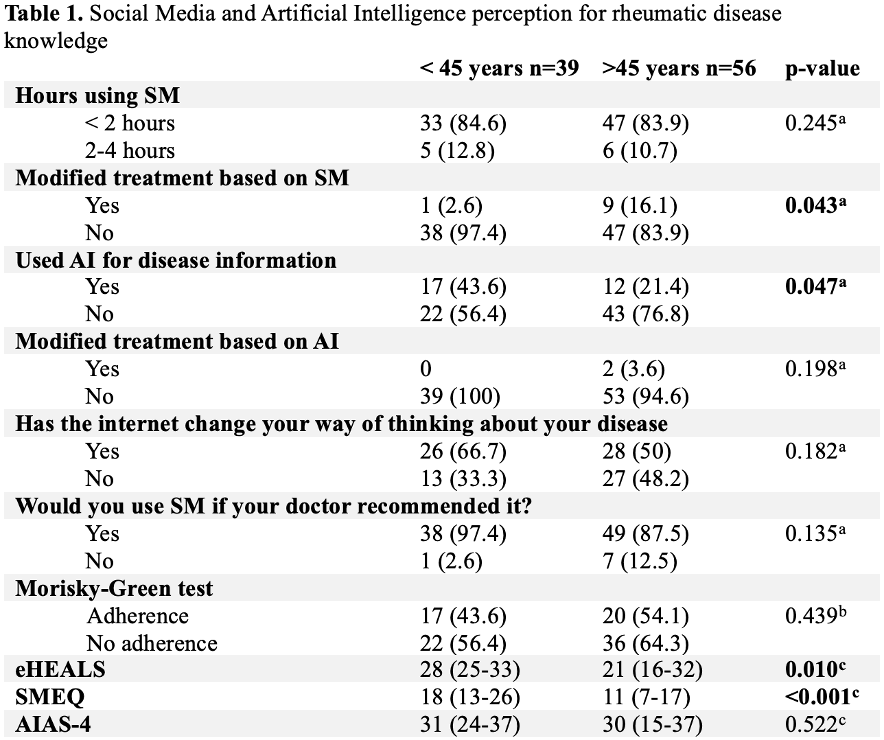Session Information
Date: Tuesday, October 28, 2025
Title: Abstracts: ARP II: Perception, Prediction, and Prevention (2603–2608)
Session Type: Abstract Session
Session Time: 3:45PM-4:00PM
Background/Purpose: Social media (SM) and Artificial Intelligence (AI) are common sources of health information for patients with chronic diseases. Seeking medical information from unreliable sources can negatively affect the health perspective of patients with rheumatic diseases and their treatment adherence. We aimed to determine the influence of SM and AI on disease perception and treatment adherence in patients with rheumatic diseases.
Methods: We conducted an observational, cross-sectional study at an outpatient rheumatology clinic. Patients >18 years and with at least one rheumatologic diagnosis were included. Electronic health literacy was assessed with eHEALS higher scores indicating better electronic medical understanding. The impact of SM on daily life was evaluated with social media engagement questionnaire (SMEQ), higher scores indicating more involvement of SM. Morisky-Green test was used to evaluate treatment adherence, with a score > 3 indicating adherence. To assess the perspective of AI, Artificial Intelligence Attitude Scale (AIAS-4) was utilized. A comparison was done between two groups of ages (< 45 and >45 years). Descriptive analysis was performed. Chi-square test and Mann-Whitney´s U test were utilized, as appropriate. A p-value < 0.05 was considered significant.
Results: A total of 95 patients were included, of whom 88 patients were women (92.6%), with a median age of 50 (IQR: 39-60). The most common diagnoses were rheumatoid arthritis (n=46/48.4%) and systemic lupus erythematous (n=27/28.5%). The most common duration of disease was 1-4 years (n=39/41.4%). Most patients use smartphones (96.8%), and 58.9% use computers. In addition, 94.7% of patients use SM daily, with Facebook being the most common (n=68/71.6%) and spending less than two hours seeking information about their disease (n=80/84.3). Regarding the use of AI, 45 patients (47.4%) use AI, and 29 patients (30.5%) have used AI to seek information about their disease. Half of the patients (56.8%) believe that the internet has changed their perspective of their disease, making them more interested in their condition (n=23/24.3%). Most patients consider that their doctor is open to talking about the information found on internet platforms (n=80/84.2%) and would use SM if their doctor recommended it (n=87/91.6%). Patients < 45 years (n=39) were less likely to modify their treatment based on information found on SM and tend to use more AI to seek information about their disease, compared to patients >45 years (n=56) (p= 0.043, p=0.047, respectively). Regarding eHEALS, patients < 45 years have more electronic health literacy than patients > 45 years (p=0.010) and tend to be more involved in SM (p= < 0.001). There were no significant differences between treatment adherence and the perspective of their disease based on the information from SM or AI (Table 1).
Conclusion: More than half of our patients believe that the internet has changed their perspective of their disease, making them more interested in their condition. Younger patients have greater electronic health literacy, are more engaged in social media, and are more likely to use AI for health information. However, they are less prone to modifying their treatment based on this information.
 a Fisher´s exact test; b Chi-square test; c Mann-Whitney´s U test; SM: Social media; AI: Artificial Intelligence; eHEALS: eHealth literacy scale; SMEQ: Social media engagement questionnaire; AIAS-4: Artificial Intelligence Attitude Scale
a Fisher´s exact test; b Chi-square test; c Mann-Whitney´s U test; SM: Social media; AI: Artificial Intelligence; eHEALS: eHealth literacy scale; SMEQ: Social media engagement questionnaire; AIAS-4: Artificial Intelligence Attitude Scale
To cite this abstract in AMA style:
Sanchez-Peralta E, Gamez-Siller P, Garza-Elizondo A, Fuentes-Rios F, Garcia-Ramos G, Gauna Leal D, Silva-de Leon A, Valdez-Benavides N, Cardenas-de la Garza J, Alarcon-Jarquin M, Galarza-Delgado D, Flores-Alvarado D. The Impact of Social Media and Artificial Intelligence on Illness Perception and Treatment Adherence in Patients with Rheumatic Diseases [abstract]. Arthritis Rheumatol. 2025; 77 (suppl 9). https://acrabstracts.org/abstract/the-impact-of-social-media-and-artificial-intelligence-on-illness-perception-and-treatment-adherence-in-patients-with-rheumatic-diseases/. Accessed .« Back to ACR Convergence 2025
ACR Meeting Abstracts - https://acrabstracts.org/abstract/the-impact-of-social-media-and-artificial-intelligence-on-illness-perception-and-treatment-adherence-in-patients-with-rheumatic-diseases/
